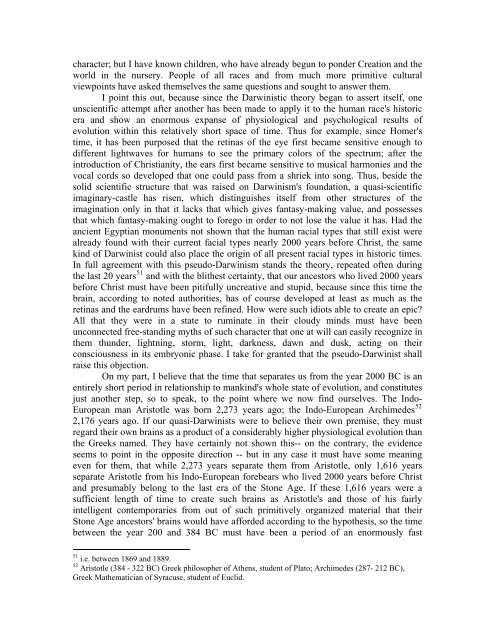Viktor Rydberg's Investigations into Germanic Mythology, Vol. II
Viktor Rydberg's Investigations into Germanic Mythology, Vol. II
Viktor Rydberg's Investigations into Germanic Mythology, Vol. II
Create successful ePaper yourself
Turn your PDF publications into a flip-book with our unique Google optimized e-Paper software.
character; but I have known children, who have already begun to ponder Creation and the<br />
world in the nursery. People of all races and from much more primitive cultural<br />
viewpoints have asked themselves the same questions and sought to answer them.<br />
I point this out, because since the Darwinistic theory began to assert itself, one<br />
unscientific attempt after another has been made to apply it to the human race's historic<br />
era and show an enormous expanse of physiological and psychological results of<br />
evolution within this relatively short space of time. Thus for example, since Homer's<br />
time, it has been purposed that the retinas of the eye first became sensitive enough to<br />
different lightwaves for humans to see the primary colors of the spectrum; after the<br />
introduction of Christianity, the ears first became sensitive to musical harmonies and the<br />
vocal cords so developed that one could pass from a shriek <strong>into</strong> song. Thus, beside the<br />
solid scientific structure that was raised on Darwinism's foundation, a quasi-scientific<br />
imaginary-castle has risen, which distinguishes itself from other structures of the<br />
imagination only in that it lacks that which gives fantasy-making value, and possesses<br />
that which fantasy-making ought to forego in order to not lose the value it has. Had the<br />
ancient Egyptian monuments not shown that the human racial types that still exist were<br />
already found with their current facial types nearly 2000 years before Christ, the same<br />
kind of Darwinist could also place the origin of all present racial types in historic times.<br />
In full agreement with this pseudo-Darwinism stands the theory, repeated often during<br />
the last 20 years 51 and with the blithest certainty, that our ancestors who lived 2000 years<br />
before Christ must have been pitifully uncreative and stupid, because since this time the<br />
brain, according to noted authorities, has of course developed at least as much as the<br />
retinas and the eardrums have been refined. How were such idiots able to create an epic?<br />
All that they were in a state to ruminate in their cloudy minds must have been<br />
unconnected free-standing myths of such character that one at will can easily recognize in<br />
them thunder, lightning, storm, light, darkness, dawn and dusk, acting on their<br />
consciousness in its embryonic phase. I take for granted that the pseudo-Darwinist shall<br />
raise this objection.<br />
On my part, I believe that the time that separates us from the year 2000 BC is an<br />
entirely short period in relationship to mankind's whole state of evolution, and constitutes<br />
just another step, so to speak, to the point where we now find ourselves. The Indo-<br />
European man Aristotle was born 2,273 years ago; the Indo-European Archimedes 52<br />
2,176 years ago. If our quasi-Darwinists were to believe their own premise, they must<br />
regard their own brains as a product of a considerably higher physiological evolution than<br />
the Greeks named. They have certainly not shown this-- on the contrary, the evidence<br />
seems to point in the opposite direction -- but in any case it must have some meaning<br />
even for them, that while 2,273 years separate them from Aristotle, only 1,616 years<br />
separate Aristotle from his Indo-European forebears who lived 2000 years before Christ<br />
and presumably belong to the last era of the Stone Age. If these 1,616 years were a<br />
sufficient length of time to create such brains as Aristotle's and those of his fairly<br />
intelligent contemporaries from out of such primitively organized material that their<br />
Stone Age ancestors' brains would have afforded according to the hypothesis, so the time<br />
between the year 200 and 384 BC must have been a period of an enormously fast<br />
51 i.e. between 1869 and 1889.<br />
52 Aristotle (384 - 322 BC) Greek philosopher of Athens, student of Plato; Archimedes (287- 212 BC),<br />
Greek Mathematician of Syracuse, student of Euclid.
















